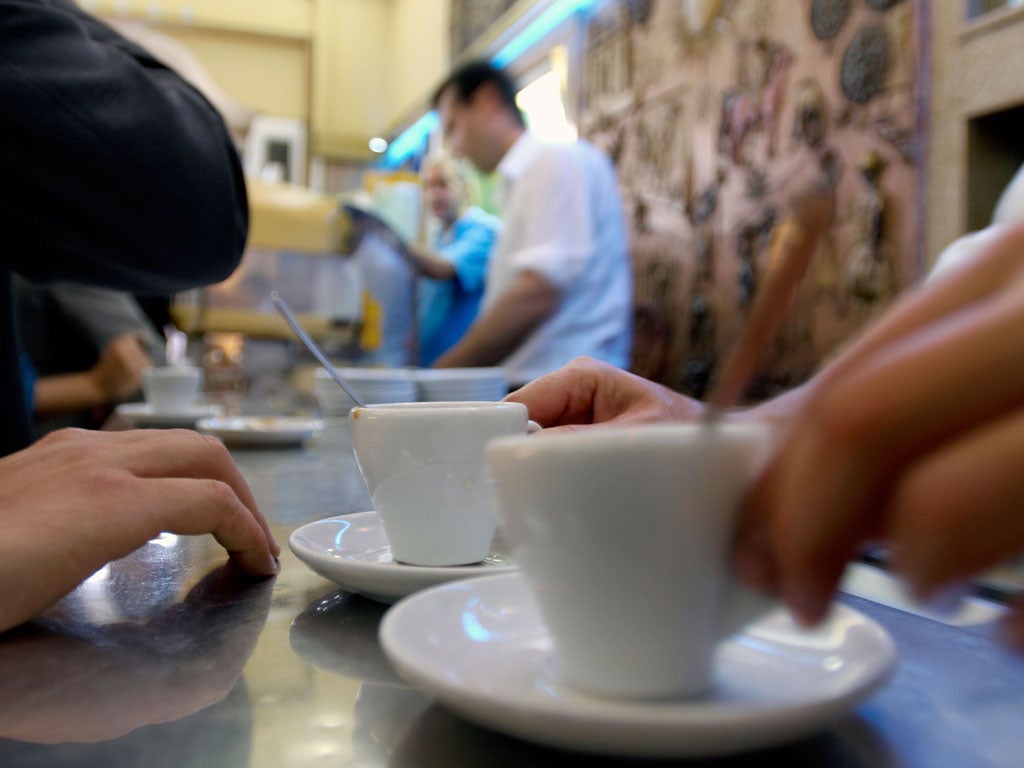Alice Jones: Hold the artisanal coffee. I'll put the kettle on

It is a good time to bury bad news so it is just possible that, in the midst of the gold rush, you may have missed the news that the apocalypse is upon us. Citizens, gird your loins, man the barricades and make a witty placard: the attack of Tescobucks is upon us! This week, Britain's most ubiquitous supermarket chain (2,975 shops and counting) announced its plans to launch a chain of "artisan" coffee shops across the UK. The chain, named Harris and Hoole after two coffee-house wits who feature in Samuel Pepys' diaries (it's arty and artisan), will open its flagship in Amersham at the end of the month. A dozen or so will follow and, before long, the entire nation will be being drip-fed chai lattes and bran muffins by baristas in felt aprons while leaning artfully on scrubbed wood stools.
The business will be run by the Tolleys, the Australian family that started the London barista spots Taylor St Baristas. These are the kind of caffeine emporia whose Instagrammy website tells you the name of the boss barista in each branch, goes into wearisome detail about the origin of every coffee bean, and, in the section signposted Food, jokes: "The word Artisan is thrown around a lot these days. We are even classed as an Artisanal Independent by one coffee guide. Our food ethos is simple…"
Anyway, back to the announcement of Harris + Hoole, the newest "artisan" addition to the high street. Tesco will take a 49 per cent stake, but there will be no sign of its blue-and-red branding. "We support their vision to bring premium coffee to a wider audience," says the supermarket. They also, no doubt, support the vision that even in a recession people will spend up to £3 on a daily "essential" that they could brew at home for a fraction of the price.
The announcement will bring more hand-wringing about the death by homogenisation of the Great British High Street, but I'm not so sure that Harris and Hoole spells the end for the humble independent café. They are thriving like never before in a land where a mid-afternoon break used to be a cup of PG and a custard cream but is now a feast of flat whites, polenta cakes and amaretti cookies.
Besides, if Tesco imagines that it can cash in on the java pound with a few blackboards and brown paper menus, it underestimates the fierce commitment of the coffee snob. You know the type – won't touch a cup unless he or she knows the name and birthday of the Nepalese coffee picker behind it. For them, the dawn of Harris and Hoole represents Armageddon. For the rest of us, who understand that coffee is just something that you drink, the news is merely a chance to pause for thought – and maybe have a nice cup of tea.
This tops the list of annoying arts lists
It's tough being an arts journalist. Just when you've finally ticked off every history play or listened to every Bob Dylan B-side, along comes Another List. Last week, it was the BFI's Greatest Films top 100 (or the Where Shall We Put Citizen Kane This Time? poll) which sent me into a downloading panic. Now comes a top 10 of the most difficult books ever written. So difficult, in fact, that it has taken the culture website The Millions three years even to draw up its list.
Hegel's The Phenomenology of Spirit, Heidegger's Being and Time and Nightwood by Djuna Barnes are on there, as are, predictably Joyce and Swift, for Finnegans Wake and A Tale of Tub respectively. (Their easy beach reads Ulysses and Gulliver's Travels didn't quite make the cut). And predictably, I haven't read a single one. It's crushing, which is, no doubt, the intended effect.
The Millions Most Difficult is out to make most people feel as inadequate as possible about their cultural consumption while a few smug bookworms post their scores on Facebook. "OMG! 8 out of 10! Nine if you count the two times I read The Faerie Queen, aged 16..."
No. It's time to put our collective shame to good use and make a stand. Down with this obsessive ranking and ticking-off of True Art! From now on, I resolve to ignore all lists. It might even free up time for me to finish Middlemarch (No 27, BBC Top 100 Books) finally.
Men are funny about funny women
I've spent the past week in Edinburgh, covering the Fringe. While the nation has been happily embracing a gaggle of "golden girls" in sport, its feelings towards champion funny girls remain lukewarm. In a blog on The Independent's website, the comedian Catriona Knox writes that a punter refused to take a flyer for her show, saying, "Thanks, but no thanks. No offence – I just don't think you lot are all that funny."
Many of the best-reviewed shows so far this year come from women – Sara Pascoe, Felicity Ward, Susan Calman and Cariad Lloyd, to name a few – and yet the gender debate persists. This week, to prove the point, I spotted the heftiest back-handed compliment I've seen on a flyer. Beneath the blurb for Martha McBrier's show, People Person, is the following gem: "'I genuinely kept forgetting I was watching a woman': The Scotsman." I hope it's a joke but I have a feeling that it could be deadly serious.
Join our commenting forum
Join thought-provoking conversations, follow other Independent readers and see their replies
Comments
Bookmark popover
Removed from bookmarks